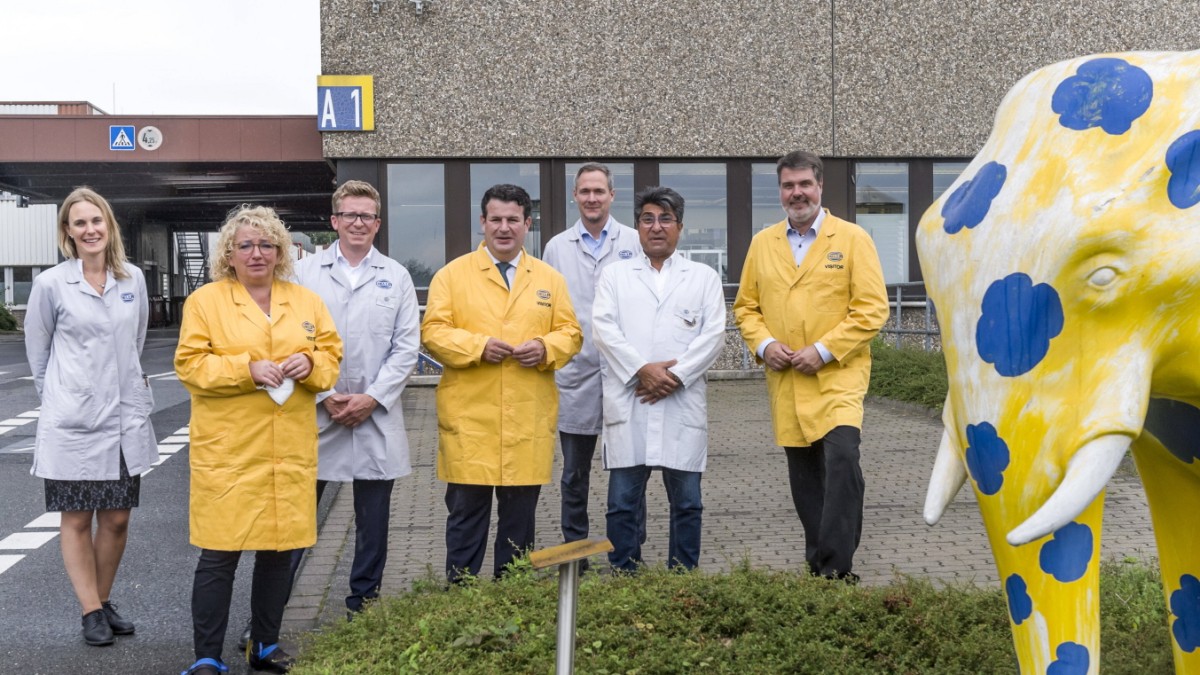Hubertus Heil has just arrived in Bamberg when he is recognized for the first time in front of the train station. A passer-by lets his backpack slide on the floor and pulls out the cell phone. Could he get a photo with the minister? Heil willingly stands next to him, looks friendly. Then when saying goodbye the man says: “I always choose you anyway!” So they still exist, the convinced SPD voters. “And at the moment more and more of them,” says Heil and looks very satisfied.
Heil traveled to Franconia at the end of a week that began with what he saw as a very positive survey: for the first time in a long time, his SPD was on a par with the Union. But on these two days, Heil is not on the road as a social democrat, but as minister of labor and social affairs. But is that even possible? Four weeks before a federal election?
It’s a summer trip when ministers and journalists in tow visit a selected region to see what has become of its laws and regulations. When Salvation’s journey was devised, it seemed plausible that it would be his last as a minister. Now, however, since nobody laughs anymore when the SPD candidate Olaf Scholz says that he could of course become chancellor, it is suddenly no longer impossible that not only the current minister, but perhaps also a future minister, will visit a brewery, a bakery or a social department store.
Heil is not a fantasy, but rather tangible – and for far too long in politics not to know that a lot can happen in the election campaign and in coalition negotiations. It was also a surprise that he was the Minister of Labor the last time after the month-long struggle between the Union and the SPD. On this trip to high-tech workplaces, truck drivers and a piano manufacturer, however, it looks like someone wants to continue – if it happens.
“Do you have any problems here somewhere?”
First stop at Siemens Healthineers in Forchheim. 66,000 employees worldwide, 13,500 patents, 14.5 billion euros in sales. “Just that you know: We are the market leader,” says board member Christoph Zindel zu Heil, who sits in the glass conference room and listens to Zindel talking about how the company’s products, from rapid tests to intensive care medicine, were in demand during the pandemic.
On the way to production, Heil then asks: “Tell me, do you have any problems here somewhere? I’m a happy Minister of Labor, with what I see here.” Shortly afterwards, in the assembly hall, he had a trainee tell him how he got his apprenticeship position and said a second time: “You see me as a happy Minister of Labor when I see you.”
In the past few years, Heil has often spoken of the future of work and that work will not disappear through digitization and automation, but that it will be different work. His continuing education laws went beyond the coalition agreement, but Heil could actually imagine even more if he got the opportunity to do so. “Now I’ll say a big word,” he says on the way, “that we in Germany have to become a republic for further training.”
“Phew,” says the minister at the truck stop
Heil knows very well that the world of work doesn’t sparkle everywhere like it does at Siemens in Forchheim, that elsewhere it’s less about paid training than about compliance with labor laws.
This is exactly what he sees a few hours later, at the Himmelkron truck stop. The team from “Faire Mobility”, an initiative funded by the ministry, is waiting in the parking lot. Among other things, it addresses long-distance drivers in parking lots in their mother tongue and explains what rights they have, for example to the German minimum wage. The group is also active in the meat industry, or in care.
You can read all the news about the federal election, the current Corona situation in Germany and worldwide, as well as the most important news of the day, twice a day in our Newsletter. Sign up for a free account: sz.de/morgenabend. In our News app (download here) you can also subscribe to the news newsletter or breaking news as a push message.
Michael Wahl, Transport Coordinator, paints a bleak picture of the working conditions of mostly Eastern European truck drivers. “It is almost impossible to find a fair job as a truck driver in all of Europe,” he says. The initiative shows drivers, for example, how they can document their journeys so that they can later claim the German minimum wage for routes on which it would have allowed them. Some dared to take this step, reports Wahl, but not many. According to Wahl, they have already had around 6,500 conversations with drivers. He has personally never met anyone who deserves what he was entitled to. “Phew,” says a very wet minister after inspecting the cab of a Polish truck driver in the pouring rain.
A pianist talks about her “existential panic”
One day later he is in the piano manufacture Steingraeber & Sons in Bayreuth. There is a smell of wood, there are curved pieces of wood in the workshop that you can tell that they will one day become a grand piano. Heil had just sat in the company’s chamber music hall and listened to the pianist Lisa Wellisch. Not until she played Chopin’s Fantasy Impromptu. Then when she told how musicians and other solo self-employed had fared in the pandemic. “This existential panic is just terrible,” she said. Aid programs such as “Neustart Kultur” helped, but were always project-related. “What use is that to survive?” And now, she reports, many organizers are only relying on the big stars for the time being. Concerts were worth it, even in a half-empty hall.
In the workshop, the minister is having the importance of the soundboard explained to him for the quality of the grand piano. “You have that in common with politics,” he says to the piano maker. “We too live from the soundboard.”
Paul is a talented author and journalist with a passion for entertainment and general news. He currently works as a writer at the 247 News Agency, where he has established herself as a respected voice in the industry.

